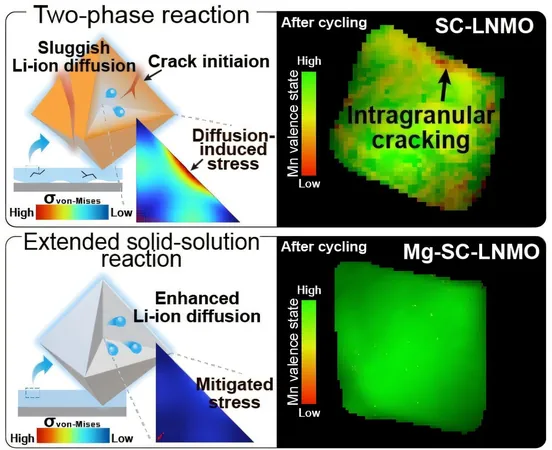
Groundbreaking Study Links Menopause to Accelerated Multiple Sclerosis Progression
2025-01-14
Author: Wei Ling
Introduction
Recent research from the University of California, San Francisco (UCSF) has revealed a concerning connection between menopause and the accelerated progression of multiple sclerosis (MS), particularly affecting women's mobility and overall quality of life.
Key Findings
The study found that the Timed 25-Foot Walk scores for participants deteriorated significantly post-menopause, suggesting a pattern of declining mobility that has prompted researchers to delve deeper into female MS patients’ experiences. This marks a notable advancement in data quality compared to earlier studies that primarily relied on the Expanded Disability Status Scale (EDSS).
Hormonal Factors
Dr. Riley Bove, an associate professor of neurology at UCSF and the lead author of the study, shared insights into the hormonal factors at play. "We've known that hormonal changes during puberty can trigger autoimmune diseases like MS. Interestingly, pregnancy brings a temporary reprieve, with a decrease in relapses during the third trimester, only to see a rebound postpartum," she stated.
Relevance for Women
Considering that women make up approximately 75% of MS patients, the implications of this study are particularly relevant for the female population facing menopausal changes. The research sought to investigate how hormone therapy (HT) might assist the estimated 30% to 40% of perimenopausal and postmenopausal MS patients.
Study Details
In this study, the researchers analyzed individuals diagnosed with MS or clinically isolated syndromes using international diagnostic criteria. Participants included cisgender women whose menopausal status was confirmed within a year of their final menstrual period. A comprehensive Gender-Inclusive EPIC Lifestyle Questionnaire was employed to gather reproductive data, including menopausal status, reasons for menopause, and HT usage. Additionally, follicle stimulating hormone (FSH) levels were utilized to ascertain menopause status, particularly among those who underwent fertility-sparing hysterectomy.
Hormone Therapy Usage
As part of the study design, subjects receiving systemic estrogen within five years of menopause were identified for HT use. It’s important to note, however, that women affected by chemotherapy-induced menopause or with certain surgical histories were excluded from analysis.
Functional Outcomes
The primary functional outcome was measured using the Multiple Sclerosis Functional Composite (MSFC), encompassing cognitive, fine motor, and walking domains. A significant clinical deterioration was indicated by a 20% change in participants' composite scores. Secondary outcomes were derived from clinician-reported EDSS assessments, which included evaluations of various functional symptoms associated with MS.
Participant Analysis
The final analysis involved 184 participants: 100 premenopausal, 70 postmenopausal, and 14 with undefined postmenopausal status. The median age for symptom onset was reported as 37 years, with participants averaging 63 years during the most recent examinations. Remarkably, 69% of these individuals diagnosed with relapsing-remitting MS had a median disease duration of 24 years.
Results
The results showed an alarming acceleration in the MSFC scores post-menopause, particularly for cognitive and fine motor skills, while significant worsening was noted in walking abilities. On the other hand, the EDSS scores revealed a marked deceleration of worsening symptoms after menopause.
Need for Further Research
However, it’s worth mentioning that only 17% of participants were using estrogen therapy, leading researchers to advocate for more comprehensive randomized trials. "Our understanding of hormone therapy's impact on such a complex condition as MS is still evolving. More extensive research is necessary to uncover the true effects of hormone treatment," Dr. Bove concluded.
Conclusion
With these groundbreaking findings, it becomes increasingly crucial for healthcare providers to consider menopause as a potential factor in the management and treatment of multiple sclerosis in women. As the study sheds light on this significant connection, many in the medical community hope it will lead to better-targeted interventions and a better quality of life for women living with MS.
Call to Action
Stay informed – your health could depend on it!



 Brasil (PT)
Brasil (PT)
 Canada (EN)
Canada (EN)
 Chile (ES)
Chile (ES)
 Česko (CS)
Česko (CS)
 대한민국 (KO)
대한민국 (KO)
 España (ES)
España (ES)
 France (FR)
France (FR)
 Hong Kong (EN)
Hong Kong (EN)
 Italia (IT)
Italia (IT)
 日本 (JA)
日本 (JA)
 Magyarország (HU)
Magyarország (HU)
 Norge (NO)
Norge (NO)
 Polska (PL)
Polska (PL)
 Schweiz (DE)
Schweiz (DE)
 Singapore (EN)
Singapore (EN)
 Sverige (SV)
Sverige (SV)
 Suomi (FI)
Suomi (FI)
 Türkiye (TR)
Türkiye (TR)
 الإمارات العربية المتحدة (AR)
الإمارات العربية المتحدة (AR)